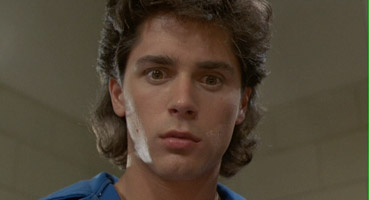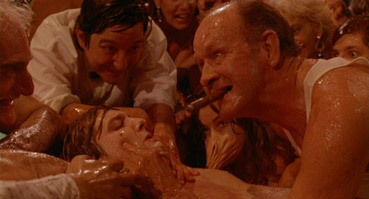| "The
rich have always sucked off low class shit like you." |
| Ferguson lays it on the line for Billy |
There
are those who think that politics have no place in genre
movies, especially horror, and also those who feel that horror
should always be subtle and psychological and should never
stoop to gross-out special effects. I am not one of these
people. It's not that I haven't had my share of moans about blood-driven
horror movies. Many of the post-Halloween slashers were prime examples of how bad things can get
when plot and character development are thrown to the four winds and actually scaring an audience becomes secondary
to hurling gore on the screen, while the recent spate of
genuinely scary, almost blood-free genre works such as Ringu, The Sixth Sense and The Others have proved a welcome breath of fresh generic air. But there is
also little worse than a film that promises or indeed
demands visceral thrills and fails to deliver. Imagine Videodrome or Day of the Dead without their
explicit violence. No way. The trick is, the body horror makeup in those
films may have been attention grabbing, but it was always
an essential element of the plot, and both films were
so much more than just vehicles for physical effects.

Horror
and science fiction have repeatedly proved perfect vehicles
for socio-political subtext, and many of the most memorable
works from both genres function on more than one level. Dawn of the Dead was a witty commentary on consumerism, Near Dark drew
parallels between vampirism and AIDS and warned of the
dangers of falling in with the wrong crowd, McCarthyism
gave Don Siegel's Invasion of the Body Snatchers real bite, while in the 1978 remake, Phil Kaufman explored the negative effects of urban alienation. And so on.
In
this vein, Re-Animator producer Bryan Yuzna's splendidly devised and executed
directoral debut is on the surface a tale of dark secrets
in high society, but also dares to suggest
that the rich are not just separated from the rest of
us by money and lifestyle, but are an altogether different
species, feeding off the so-called lower classes in more
than just a figurative sense. The message is clear – society's
self-styled elite are incestuous, parasitic monsters
hiding behind a front of smiling respectability. This
is, of course, what many of us have always suspected,
but hardly typical subtext for an American movie, even
an independent genre work such as this, which makes Society all the more remarkable. Beyond that,
the film also deals with an issue more common to teenagers
on both sides of the Atlantic and perhaps the world over,
that feeling of alienation and even disassociation from the family
unit and society as a whole.
The
plot initially unfolds in what seems like a familiar vein. Bill Whitney
is the one misfit kid in a wealthy society family. Plagued
by disturbing dreams, he becomes convinced that something
unpleasant is going on beneath the surface of his otherwise
normal life. His sister Jenny is preparing for her coming-out
ceremony but is still being pestered by ex-boyfriend
David Blanchard, who has been gathering evidence to prove
that things most definitely are not right in the Whitney
household. Bill, already creeped out by what may or may
not be hallucinatory glimpses of his sister in very peculiar bodily contortions, has his fears confirmed by
recording made secretly by David. But just what is going
on here, and how far does it spread?
Tales of an average
guy slowly uncovering a massive conspiracy were nothing
new, but the concept is still fine genre meat if inventively handled, and
Yuzna develops his story with intrigue and skill. Clues
are dropped at all the right moments, with Bill's peculiar visions inexplicit
enough to prompt the same alarmed confusion in the viewer
as in our hero. In many ways it plays like a typical American
teen movie, complete with TV-familiar faces, teenage angst
issues and family conflicts, but this recognisable surface is
repeatedly subverted by elements both surreal and sociopolitical. (The only character that feels slightly out of
place is the mother of Bill's girlfriend-to-be Clarissa,
a woman so spectacularly oddball that she almost seems
to have wandered in from a different film.)

If
the build-up is intriguing, the now-notorious climax is
something else entirely, with gross-out prosthetic effects
and political subtext colliding in a surrealistic orgy
of body horror that genuinely has to be seen to be believed.
The physical effects by the splendidly named Screaming
Mad George may seem a little obvious now, but in these
drearily CGI driven days, the physical nature of the prosthetics
on display is genuinely refreshing. It's also fun on second
and third viewings to spot how many times this scene is
quietly telegraphed by seemingly throwaway lines earlier
in the film: "Next time I see you," a cop warns
Bill after they fail to find a body Bill was sure he had
seen, "It will be a lot less pleasant." How
true this proves to be.
The dialogue often rises above the functional, particularly when dancing with subtextual suggestion. It also has a sprinkling of memorable exchanges: "How do you like your
tea?" asks Clarissa of a still apprehensive Bill,
"Cream? Sugar? Or do you want me to pee in it?" to which Bill responds after a bewildered pause, "You're a class act, Clarissa." The performances rise enjoyably above the genre average, with Billy Warlock holding his own
as the increasingly bemused Bill, Devin DeVasquez effectively
seductive as Clarissa, and the squeaky cleanliness of
Charles Lucia and Concetta D'Agnese as Bill's parents really selling the concept of the upper class as a creepily predatory alien species. Come the climax, the performers throw themselves headlong into their roles, delivering even straightforward
lines with goo-dripping relish, and seemingly revelling in the chance to dive head-first into a virtual orgy of body horror. Perhaps the nicest touch
for UK viewers is the use of the Eton Boating Song as
a key theme, though listen carefully during the closing
credits to catch the amusingly altered lyrics.
Framed at 1.85:1 and anamorphically enhanced for 16:9 TVs, this transfer is something of a revelation to those used to the VHS versions that until now have been the only way to view the film in your own home. Colours are solid and never over-saturated and black levels are good throughout, and the picture is pleasingly free of obvious edge enhancement, though some occasional artefacting is visible. Dust and scratches are almost entirely absent, but some film grain is evident, especially in the interior scenes. That apart, another fine transfer from Anchor Bay.
A Dolby 2.0 soundtrack is the only one on offer, and though almost exclusively front weighted and then geared towards the centre, the result is on the whole pleasing. Dialogue and music are clear and have a good range, though occasional lines do have a slight hissiness to them. Bass tones on the music are better than expected for an indie film of this vintage, and almost approach subwooferism a couple of times. Music sounds particularly full.
There are only two, but the key one is a goodie, a commentary track from director Brian Yuzna. His enthusiasm for the project remains high, and though he sometimes points out the obvious when discussing the film's plot points and subtextual intentions, it is nevertheless enjoyable to hear that the message comes very much from the heart. Most interesting is when he provides background information on the writing and execution of the film itself, giving useful info on most of the key figures involved. He also delivers some lovely offbeat titbits, pointing out and providing background info, for instance, on the cameo appearance of his own half-hidden 'Eat the Rich' T-shirt. We learn that on its initial release the film failed to find an audience in the US, where people too often believe (mistakenly) that they live in a classless society, but really clicked in the UK, where we are well aware of the alien nature of the so-called upper classes. The fact that one of the writers grew up in the sort of environment he sets his sights on here suggests a very interesting autobiographical element.
Other than that there is only a trailer on offer, but it is anamorphic 1.85:1 and in good shape, and it is interesting to see how the distributor tackled the problem of promoting a film whose special effects climax is its most famous and marketable feature, without actually giving the effects away.
On its release, Society found an instant fan base with those who like their horror to have a bit of allegorical depth, but also appreciate the more visceral thrills of the genre, as well as its sense of fun. It's an ideal companion piece to John Carpenter's They Live, which also proposed the idea that American society is run by an alien species, and the films are different enough in content, tone and style to avoid being obviously lumped together. This DVD release has been a long time coming but has been worth the wait for the picture quality and Yuzna's informative commentary.
Given its popularity with UK genre fans over the US equivalent, it's a surprise that Anchor Bay UK have yet to announce a PAL version. Elsewhere on the Net, I have seen at least one review that is openly hostile to the film, almost to a comically spiteful degree. Take no notice – after all, you never know who the writer really is beneath the surface.
|